A Máltai Fiatalok ősszel kezdődött programsorozata, a Coffee To Go – Az önkéntesség új formája elérkezett harmadik alkalmához. Migráció – Befogadás határon innen és túl címmel tartottak kerekasztal beszélgetést napjaink egyik legvitatottabb társadalmi-politikai kérdéséről, a menekültválságról. A teljes beszélgetés a cikk végén meghallgatható.
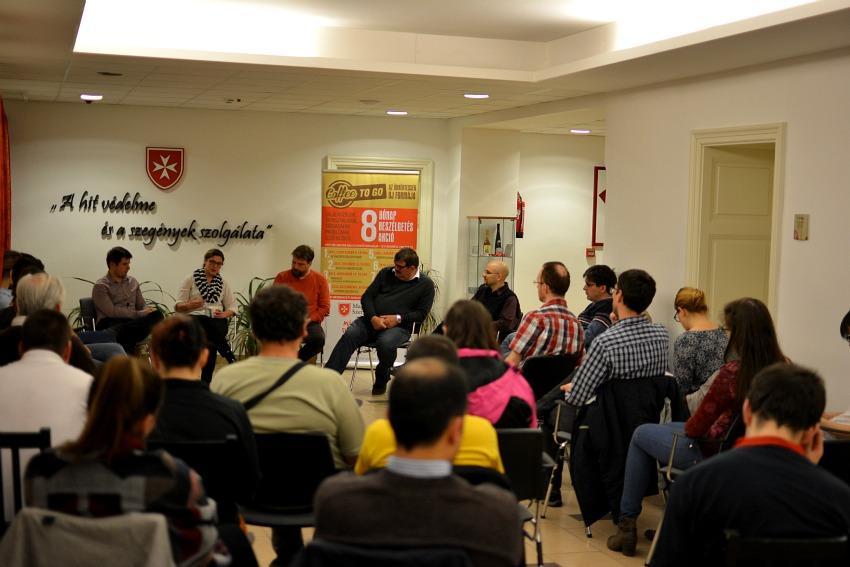
A magyarországi szeretetszolgálatokat az elmúlt fél évben rendszeresen érték támadások a menekültüggyel kapcsolatos szerepvállalásuk miatt. Most egy asztalhoz ültek a szervezetek vezetői, és őszintén beszéltek kétségeikről, a hatékony munkát megnehezítő tényezőkről, valamint félelmeikről és reményeikről a jövőt illetően.
„A menekültek megérkezésével teljesen új probléma jelent meg Magyarországon. Bár a legtöbben továbbmentek Németország felé, hosszú távon mindenképp több menekült lesz, mint eddig, és nekünk segíteni kell őket” – mondta el Ghyczy Gellért, a Baptista Szeretetszolgálat módszertani munkatársa. „A szakmánk eddig még nem nagyon tudott erről a témáról megfelelő keretek közt beszélni. Sokszor megdöbbenek, hogy a hajléktalan-ellátásban dolgozó szociális szakemberek egy része ugyanolyan előítéletesen tud gondolkozni a menekültekről, mint az utca embere a hajléktalanokról. Pedig a szociális munkás pontosan tudja, milyen alaptalan butaságokat mond az átlagember a hajléktalanokról – ő mégis ugyanezt teszi a menekültek kapcsán.”

„Nekünk álláspontunk nincs, küldetésünk van. Mégpedig az, hogy a rászoruló emberen segítsünk” – idézte Kozma Imre atya irányadó mondatát a menekültkérdéssel kapcsolatban a Magyar Máltai Szeretetszolgálat ügyvezető alelnöke, Győri-Dani Lajos. „Soha nem volt dolgunk, hogy azt nézzük, hogy a segítségre szoruló ember egyébként hibás, nem hibás, jó vagy rossz. Amikor a mentőseink kivonulnak egy balesethez, akkor nem kérdezik meg, hogy ne haragudjanak, ki volt a hibás? Mert akkor őt most nem vinnénk el… Az ítéletalkotás nekünk ezekben a pillanatokban nem dolgunk. Éhes vagy? Kapsz enni. Fáj a lábad? Megnézem. Egyszerűen odamegyünk és segítünk.”
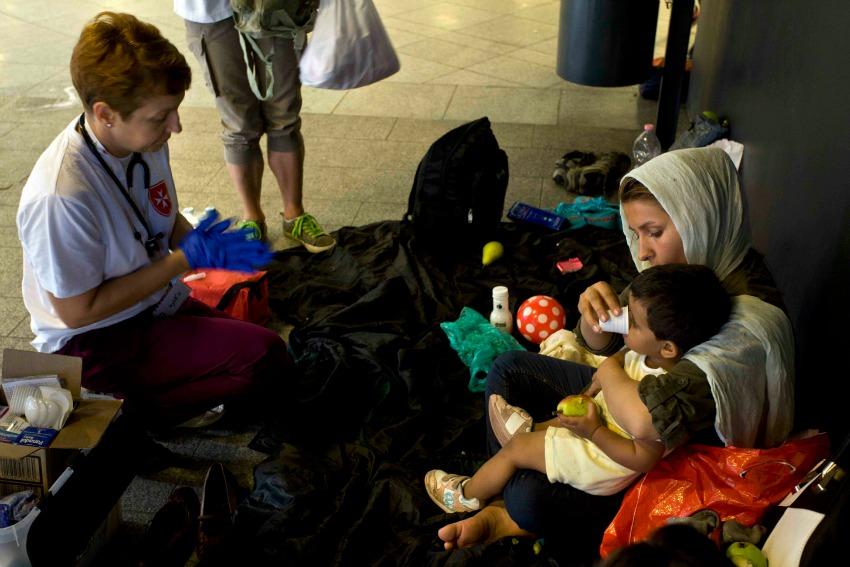
Győri-Dani Lajos hozzátette, hogy ilyenkor egy nagy szervezetnek olyan felelősségei is vannak, amelyekkel mozgalomszerű szervezeteknek még nem kell számolniuk. Mikből fakadtak a félelmeik a kezdetekben? „A Közel-Keleti országokkal nekem volt a legtöbb tapasztalatom, és tudtam, mennyire megnehezítik a vallási és kulturális különbségek a segítségnyújtást. Jól kell ismerni a szabályokat ahhoz, hogy a segítők megfelelően tudjanak reagálni bizonyos helyzetekre, az orvosok és az ápolók tudják, hogy közelíthetnek a nőkhöz, férfiakhoz, gyerekekhez.”
Az aggodalmak másik összetevőjeként a Máltai Szeretetszolgálat alelnöke a helyzet súlyos átpolitizáltságát látta. A politika leegyszerűsítette a kérdéseket, és a menekültekre használt mindegyik definíció (illegális migráns, gazdasági bevándorló, stb.) érzelemmel telített lett. Ezt Nagy Gábor, a Magyar Vöröskereszt főigazgató-helyettese is megerősítette: „az elején önkénteseket is azért volt nehéz találni, mert a szélsőjobb retorikája azt sugallta, hogy ne nagyon akarjanak segíteni ezeken az embereken. Akik mégis belevágtak, találkoztak a családokkal, látták a problémáikat, egyre inkább érzékenyültek a téma iránt. Saját tapasztalataikat ezután elmondták másoknak, így sikerült új embereket is bevonni. Most már van egy olyan önkéntes bázisunk, akiket egy esetleges következő hullám esetén tudunk mozgósítani.”
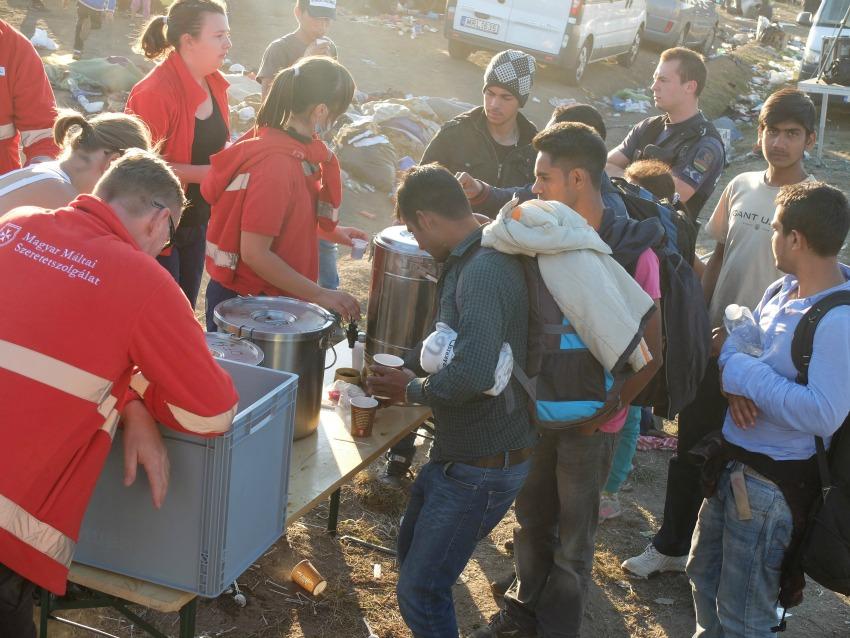
Önkénteseit és munkatársait minden szeretetszolgálat a maga erősségei alapján szervezte be. A szervezetek ott segítettek, ahol tudtak, és ahol úgy érezték, szükség van rájuk. A Magyarországon egy időben tartózkodó menekültek száma, a feladatok típusa és a fő helyszínek szerint különböző szakaszokat lehet elkülöníteni az elmúlt hónapok eseményeiben.
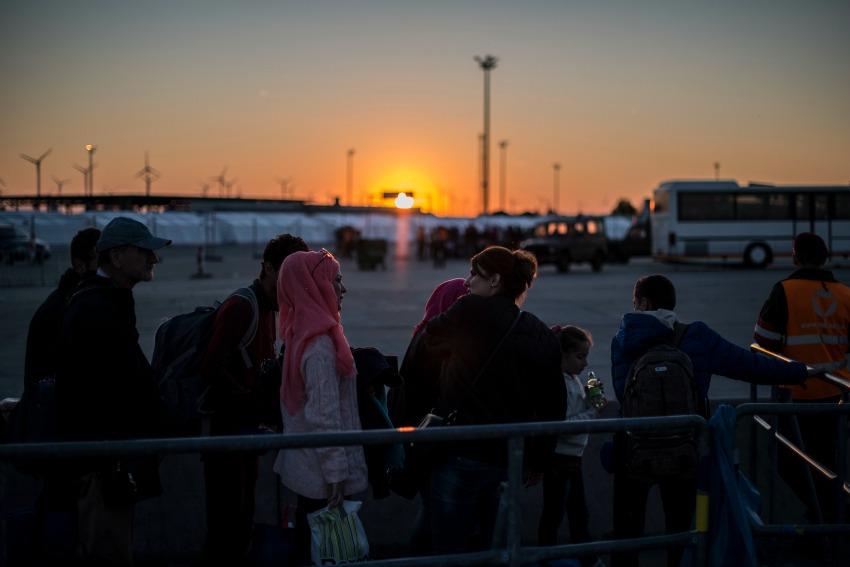
Július előtt még kisebb számban érkeztek a menekültek hazánkba. A Baptista Szeretetszolgálat már a krízis előtt foglalkozott a kérdéssel. Tavaly egy pályázat segítségével létrehoztak egy családok átmeneti otthonát, ahol elsősorban menekült és oltalmazott családok laknak, és amelynek elsősorban a társadalmi integráció a célja. Ahogy a nyár folyamán egyre több egyedülálló menekült érkezett, sikerült elkülöníteniük egy részleget számukra egy másik intézményükben. Emellett ők is részt vettek a karitatív akciókban, élelmiszercsomagot osztottak, tolmácsokat biztosítottak, önkéntes orvosaikkal az elsősegélynyújtásban segítettek, csakúgy, mint a Vöröskereszt és a Máltai Szeretetszolgálat.
A helyszín pedig a különböző időszakokban állandóan változott: először a belépő oldalon, Röszkén kapcsolódtak be a nagyobb szervezetek, majd amikor menekültek tömegei érkeztek Budapestre, a pályaudvaroknál segítettek. Később a déli határszakaszoknál és a nyugati országrészen volt jelen az összes civil szervezet. Ahogy Magyarország lezárta a határt, a szeretetszolgálatoknak is a nemzetközi terep maradt. Osztrák, szerb, horvát és szlovén területeken segítettek hosszabb-rövidebb ideig.

Eközben a hosszú múlttal rendelkező szervezetek mellett a feladatok eltérő jellege és egyre növekvő száma miatt új szervezetek is alapultak. A beszélgetésen részt vett Solymoskövi Luca, a szeptemberben indult Jezsuita Menekültszolgálat szakmai koordinátora is. „Mi nem egy gyorsan mozgó NGO vagyunk, akik azonnal kint vannak, és visznek egy pohár vizet a menekülteknek. Igyekszünk a képzés és az oktatás felől megközelíteni a problémákat, és felépíteni egy menekültek és migránsok részére alkalmazható integrációs programot.”
A Jezsuita Menekültszolgálathoz a kezdetektől sok segítő szándékú ember csatlakozott, ez terelte őket abba az irányba, hogy konkrét akcióban is részt vegyenek. A fóti gyermekotthonban tömegesen jelentek kísérő nélküli fiatalok, akiket nemzetközi jog véd, ezért nem lehet őket kiengedni az országból. Az iszlámok jelentős ünnepe, a Mubarak alkalmából az újonnan alakult szervezet önkéntesei 120 gyerekre főztek a fóti otthonban.
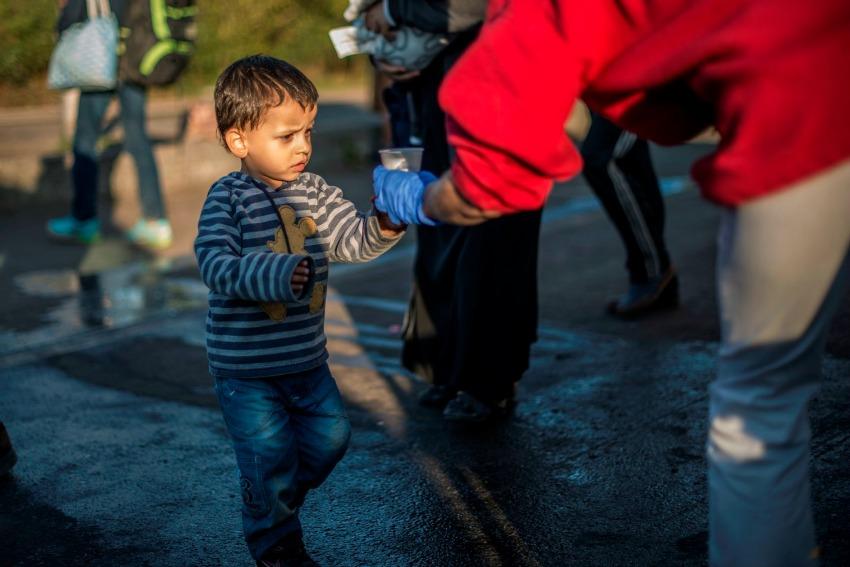
„A jelenség egész Európát társadalmi, gazdasági, szociális kihívás elé állítja, ami nekünk is komoly feladatokat fog adni” – összegezte a helyzetet Győri Dani-Lajos. „Jövő év végére mondanak még 3 millió embert, ami már abból látszik, aki készülődik vagy úton van. És akkor sem lesz vége. Nem látszik, hogy mikor fogy el a sor, pedig már abban sem voltunk igazán sikeresek, hogy a korábban bevándorló tömegeket szakszerűen és hatékonyan integráljuk. Európa feladata, hogy megpróbáljon az embereknek segíteni abban, hogy a saját hazájukban, saját közösségükben legyenek képesek élni. Nincs más út, mint hogy elképesztő nagy áldozatokat vállaljunk, és a sor végét valahol megállítsuk.”

„Azoknak az embereknek, akik mégis úgy döntenek, hogy Magyarországon maradnak, rengeteg mindennel kell megküzdeniük” – tette hozzá Ghyczy Gellért a hazai jövőképről beszélve. „Meggyőződésem, hogy aki jól érzi magát egy társadalomban, megtalálta a maga számítását, az beilleszkedik, és dolgozni fog. Persze lesznek olyan szokásaik, amik megmaradnak. De meg kell erősíteni őket abban, hogy azokat a területeket, amelyekben kulturálisan vagy személyes kompetenciák miatt jól teljesítenek, ki tudják használni. Viszont, ha azt érzik majd, hogy itt nem jutnak hozzá az alapvető dolgokhoz, akkor abból egy komolyabb konfliktus is lehet. Ezért tartom fontosnak, hogy beszéljünk ezekről a dolgokról, és legyen egyfajta nyitottság bennünk arra, hogy az újonnan érkező embereknek megadjuk az esélyt.”
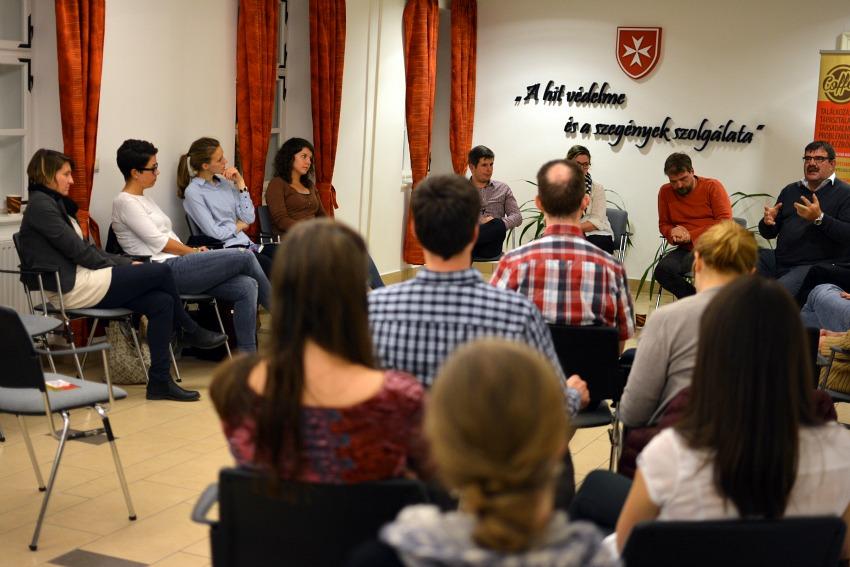
Győri Dani-Lajos egy üzenettel bocsájtotta útjára a beszélgetésre összegyűlt fiatalokat: „Az egyszerű válaszokban sok részigazság van, de ennél tovább kell gondolni a dolgot. Próbáljátok meg az egészet árnyalni magatokban. Nem feltétlenül cél, hogy a félelmeitekre (amik egyébként lehetnek jogosak) a legegyszerűbb magyarázatot adjátok. Vállalkozzatok a bonyolult válaszokra!”
Szakszon Réka / ROOSTERGNN
[:en]“We don’t take sides, we only have a mission. And the mission is to help people in need.” Leaders of Hungarian charity services had a discussion about their role in the migration crisis, the fulfilled and future tasks and other difficult questions regarding the situation of refugees.Malteser Youth of Budapest organised the third event in the frames of the program series called Coffee To Go – The new forms of volunteering. The discussion with the title Migration – Reception within and outside the borders was exploring the topic of the refugee crisis, the mostly debated social-political question of nowadays.

Hungarian charity services have been often in the centre of debates for the last half a year in connection their role in the refugee situation. Now the leaders of the organisations sat down to talk about their doubts, the factors which were making the efficient work more difficult, and they also mentioned their fears and hopes regarding the future.
“With the arrival of refugees, we have to face a totally new problem in Hungary. Even though most of them headed to Germany, on a long term, there will be definitely more refugees than before, and we have to help them in different ways” – told Gellért Ghyczy from the Hungarian Baptist Aid. “I’m often shocked about all the prejudice I tend to hear from social workers. They sometimes have really similar thoughts in connection with refugees that they are criticizing when others are talking about homeless people.”

“We don’t take sides, we only have a mission. And the mission is to help people in need” – told Lajos Győri-Dani, the vice president of the Hungarian Charity Service of the Order of Malta in connection with their role in the refugee crisis. “It has never been our task to decide whether the people who need help are right or wrong. When our ambulance arrives to the scene of an accident, they never ask whose fault it was, because then they wouldn’t bring him/her to the hospital… In these moments judgement is out of the question. Are you hungry? You can have something to eat. Do you have pain in your legs? I will try to heal it. We just go and help people.”

The vice president added: at these times a big organisation has certain responsibilities that a newly started organisation doesn’t have to count with yet. And why were they afraid in the beginning? “I had the most experience regarding the Middle-East countries, and I knew how the religious and cultural differences can cause difficulties in the helping process. The volunteers and people working on the spot have to know the rules very well, so that they can react to certain situations in a good way. For nurses and doctors it is also important to realise how they can approach men, women and children.”
Lajos Győri-Dani mentioned the politicized situation as another side of the doubts that have risen. The politics oversimplified the questions, and all the terms used for refugees (illegal refugees, economic migrants, etc.) contained some emotional content. Gábor Nagy, the deputy director of the Hungarian Red Cross agreed: “It was even difficult to find volunteers in the very beginning, as the communication of the radical right wing party in Hungary suggested that no one should help these people. Still, the ones who started volunteering, met the families, heard about their problems, turned out to be more and more sensitive about the topic. They also shared their personal experience with others, and like this it was easier to recruit new people. Right now we have a group of volunteers, who can be mobilized in case of a new wave of refugees arriving.”

All the charity services invited their volunteers and employees, and started working based on their own strength. The organizations helped wherever they could and they felt that they were needed. We can separate several stages within the events of the last months.

Until July, it was a smaller amount of refugees arriving to Hungary. The Hungarian Baptist Aid was also dealing with the question way before the crisis. Last year they started a temporary shelter for refugee families, where the basic aim was to integrate these kids and their parents to the Hungarian society. As there were more and more people arriving during the summer, they managed to separate a section of one of their institutions for refugees coming without families. Besides that, the Baptist Aid also took part in charity actions, they collected donations, distributed food packages, found translators, and supported the first aid service with their volunteer doctors – such as Red Cross and the Hungarian Charity Service of the Order of Malta.
The location also changed during all these periods: the civil organizations first joined the supporting work at the Serbian-Hungarian border, and when masses of refugees started to arrive to Budapest, they offered their services at the railway stations. Later on, when Hungary closed the borders, the charity services started working on international grounds: they helped in Austria, Serbia, Croatia and Slovenia for certain periods.

At the same time, because of the growing amount of diverse tasks, new organizations were also founded besides the long-standing charity services. Luca Solymoskövi, the lead coordinator of the Hungarian Jesuit Refugee Service explained which part of the helping process they could join: “We are not an NGO which can easily be mobilized. We are not the ones who can go and bring a bottle of water to the refugees as soon as they arrive. Our effort is to try to approach the problem from the side of education, and build up an integration program for migrants.”
There were several people offering their help to the Jesuit Refugee Service, and because of this they could take part in actions as well. There is a children’s home at Fót, a city close to Budapest, where young refugee people are sent to: they are protected by international law, and by the rules they can’t leave the country, still they manage to escape from the institution. The newly founded refugee service cooked food for 120 refugee children for the occasion when Muslims all around the world were celebrating Eid-al-Fitr, which marks the end of the fasting month of Ramadan.

“The phenomenon will be a social, economic and cultural challenge for Europe, and it will give us several new tasks” – Lajos Győri-Dani summarized the situation. “Until the end of next they are expecting 3 million more people to arrive, which is already visible by the number of refugees who are already on their way. And it’s still not the end. We have no idea when the queue will come to an end. Europe was also not succeeding in integrating people effectively who have arrived way before the crisis. The task will be to help people to stay and live at home, in their own countries, within their own communities. There is no other way then to make huge sacrifice in order to stop the queue.”

“Refugees who will decide to stay in Hungary have to cope with several things” – added Gellért Ghyczy talking about the future. “On the one hand, I am sure that if people are generally satisfied and like living in a society, they will start working and will be integrated after a time. Obviously, they will have traditions that they will keep. But they have to be supported to be able to use the areas where they are performing better culturally or because of their personal competences. On the other hand, if they feel that they are not provided with the basic needs, it can generate several conflicts on a long term. These are part of the reasons why I find it important to talk about these topics and to be open to give the chance for refugees who arrive to our country.”

The vice president of the Hungarian Charity Service of the Order of Malta closed the discussion with a message to be taken home: “We have to think several steps further than to just give the easy answers. Even though your fears can be partly true, avoid giving the simplest reasons for them. Try to get more information and have a more complex answer!”
Szakszon Réka / ROOSTERGNN
[:]